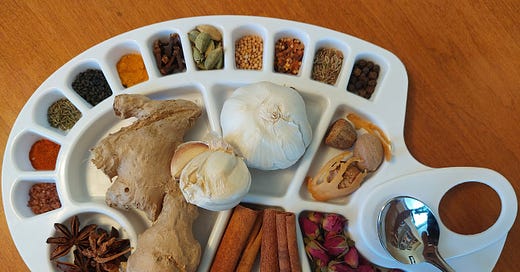What does it mean to have a great palate?
Palate and palette aren’t to be confused, but they are related. An artist’s palette holds paints and pigments- the tools of their artistic expression. And your palate holds some of your most important tools as a cook – the tastes, aromas, and textures that live in your memories.
Having a great palate allows you to tap into those memories to create great food. What was in that ice cream? Those noodles? That pizza? What made Grandma’s gingerbread so perfect? Being able to compare what you are tasting to those Platonic ideals and finding the missing links is key to being a great cook.
Great palates are made, not born, so here are some simple things you can do to train your palate and, by extension, improve your cooking:
Slow down when you eat (and turn off the screens!)
When we eat quickly our palate barely has a chance to register the flavours and aromas. Our saliva is one of the first steps in the digestive process and it has a job to do. I’m not saying you need to chew every bite exactly 20 times, but unhinging your jaw and swallowing your dinner python-style is not helpful. A little mindful observation of taste and aroma and the interplays of texture and temperature goes a long way. So savor at least at least a few bites before you get lost in the latest Netflix K-drama.
Play with spice.
Spices and herbs can take food in a completely different direction when used wisely. Find a few spices and herbs that you really like and learn to identify them by taste and aroma. Cumin and cardamom are two of my favourites; they appear in many cuisines, have many complementary flavours, and are pretty easy to notice once you start looking for them. Start with a few of your favourites and add from there.
Taste as you cook.
It’s easy to throw ingredients into a dish and then decide at the end that it needs a bit more salt or a bit more something. But do you taste your ingredients before you start? How sweet or sour are those tomatoes? How bitter is the kale? How much salt is in the broth? Tasting your ingredients in their natural (or close to natural) state give you a starting point for your cooking and lets you taste the full range of those ingredients based on their origin, the season, the variety, and even the brand. Not all things are created equal!
Take it easy on salt, sugar, and heat.
Salt opens our tastebuds and make things taste more like themselves (try some unsalted mashed potatoes and you’ll know what I mean). Our tastebuds and brains are programmed from before birth to like sweet flavours. We all know someone who puts hot sauce on everything. Salt, sugar and heat are great (I love them all!) but can be quite blunt tools when used in quantity or out of habit. Ketchup can cover up a lot of things, but it does just that – cover things up (and puts your palate on par with a three year old’s).
Quit your dirty habits.
Speaking of habits, quit your bad ones. While chefs are legendary for their smoking and other grungy habits these behaviours can wreck or at least temporarily anaesthetize your tastebuds. A glass of wine while you’re cooking is fine, but if you’re a few deep into the gin and tonics you might need some help judging the seasoning in your dish. Cannabis makes you silly and undisciplined and tobacco and vaping are just bad for you, so knock that shit off, ok?
Stick your nose in it.
An ex-partner once nick-named me “The Spice Pervert” due to my habit of unscrewing lids, opening packages, and sticking my nose in everything, so it came as no big shock when at culinary school I was able to pick out a lot of ingredients by smell alone. So when you are standing at the stove waiting for water to boil open that jar of cloves or the tin of celery seed and have a sniff. Think of it as your cooking homework!
But most of all, remember what the late Anthony Bourdain said in the opening of his now-classic series A Cook’s Tour: “As a cook, tastes and smells are my memories and now I’m in search of new ones.”
So try new things.
This seems sort of obvious, right? Picky and “plain” eaters are at a serious disadvantage when it comes to identifying flavours and aromas in food. How do you identify something if you have never tasted it? Or reject it out of hand? I was a fairly picky eater as a kid (buttered pasta for the win!) but later I realized that trying something did not obligate me to finish it, like it, or eat it every day. Trying new things and trying them more than once helps you to find out why you don’t like them, or what parts of them you do enjoy. You might like the flavour but hate the texture. You might like that vegetable roasted even if you hate it steamed.
I actually seek out things that I think I won’t like, particularly if it is a signature dish or a local specialty; spaghetti with cuttlefish in its own ink at a hole-in-the-wall in Venice is as good as that dish gets. It won’t be getting a repeat from me, but it was experience like no other and a taste that even a decade later I can’t forget.
So treat yourself to some fresh spices. Grow some herbs on your windowsill. Try some aged kimchi even if the smell freaks you out. Give beets (another) chance. No matter what’s on the menu, your palate will thank you.



